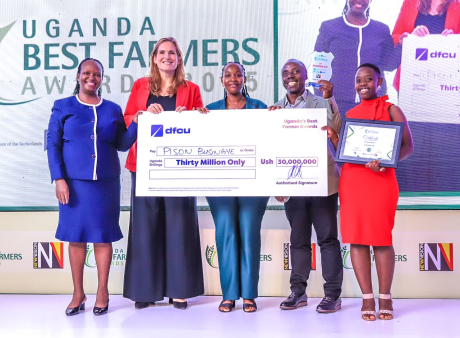By Julius Akais Osauro
In Uganda, agriculture is not just an economic sector, it is the heartbeat of the nation resting on the shoulders of its smallholder farmers.
Yet, these smallholder farmers continue to face a constellation of risks from erratic weather, volatile markets, outdated practices limiting good yields to lack of collateral which locks them out of formal credit.
At PostBank Uganda, we recognize that extending credit to this critical sector is not merely an exercise of lending; it is a strategic investment in fostering prosperity for Ugandans.
To sustainably grow our agribusiness portfolio while safeguarding the bank’s capital, we have embraced a model of shared responsibility: forging innovative partnerships that share, transfer and manage risk across the agricultural value chain.
PostBank is reimagining risk not as a burden, but as a shared responsibility. By aligning with government, insurers, technical experts, and development partners, we have built an ecosystem where risks are mitigated collectively, unlocking capital for those who need it most.
In collaboration with the Bank of Uganda, PostBank taps into the Agriculture Credit Facility (ACF) to offer agribusiness loans.
Through ACF, the bank has supported Agricultural commercialization by directly funding projects involved in primary agriculture, agro-processing and grain trade & Pulses. Through block allocation arrangement, the bank has extended funding directly to small holder farmers that are involved in primary agriculture, agro-processing and grain trade & Pulses.
Through partnerships with insurance firms such as CIC, PostBank has integrated weather-indexed insurance into its loan products to deal with weather calamities such as floods and droughts.
Under this arrangement, farmers receive direct payouts that cover a portion of their losses, ensuring they can replant, restock inputs, and honor loan repayments.
Agricultural SMEs are the linchpins of inclusive agricultural growth. They have the potential to facilitate pathways out of poverty for both smallholder farmers and low-skill workers, particularly women and youth, transitioning into the formal economy.
Yet most agricultural SMEs fail to realize this potential in large part because they lack access to finance and the capacity to manage it. The financing gap for agricultural SMEs in the “missing middle” is estimated at $65 billion across Sub-Saharan Africa. Since 2022, PostBank has partnered with Aceli Africa to support in closing this gap.
Aceli Africa (Aceli) is a market catalyst that unlocks private sector lending for agricultural enterprises.
Drawing upon new data that explains the credit gap for small- and medium-enterprises (SMEs) in the agriculture sector, Aceli offers financial incentives to a marketplace of 45+ commercial banks and innovative finance companies to share in the risk and defray the high transaction costs of lending to agricultural SMEs. Aceli also offers capacity building for lenders and investment readiness technical assistance for Agri-SMEs.
The bank’s Partnership with Aceli since 2022, has more than doubled our Agri-SME loan portfolio, thus reaching more smallholder farmers, women, and youth. We also now have visibility on the impact our Agri-SME loans are creating in the communities where we work, especially on climate resilience, food security, and opportunities created for women and youth. The ongoing capacity-building support on climate finance and Agri-finance will help the bank to fast- track achievement of our sustainability and ESG targets.
Collateral support and refinancing through aBi (Agribusiness Initiative)
Through its partnership with aBi, the bank has provided financing to farmers who lack sufficient collateral but are engaged in viable agribusinesses. This initiative has enabled farmers to access the necessary capital to grow their businesses and contribute to the agricultural sector’s development, even without traditional collateral.
This arrangement has been able to unlock financing for refugee farmers, women’s associations, and emerging agribusinesses in marginalized regions, traditionally deemed too risky by conventional banks.
By shifting the collateral burden, we have democratized access to capital, enabling entrepreneurs at the grassroots to access our tailored Agriculture loan products such as Input Financing Loans , Working Capital Loans, Produce Marketing Loans, Post-Harvest and Value Addition Loans, Farm Infrastructure Development Loans, Livestock Financing Loans, and Equipment and Mechanization Loans.
PostBank is also promoting cooperative and block-financing approaches for smallholder groups. Farmer associations, co-operatives, and group lending models allow smallholders to negotiate better prices, access collective financing under block allocations, and achieve economies of scale.
Our approach to disbursing loans is based on understanding farmers’ needs with loans structured around the agricultural business and seasonal cycles where we provide seasonal grace periods for farmers engaged in direct production, revolving lines of credit and overdraft traders, processors and transporters in the value chain as well as term loans for asset acquisition.
These disbursements occur in tranches tied to budgeted activities such as land clearing, planting, weeding, harvesting, which has significantly reduced fund diversion risk.
PostBank’s rigorous field validation and continuous monitoring, from project onset to completion, has ensured timely intervention.
Our engagements with farmers extend to regional forums that bring together farmers, different farmer organization leaders, district leaders, agronomists, input suppliers, and off-takers. These forums serve as a platform to disseminate best practices on planting windows, weed management, cash flow planning, and market linkages.
We continue to observe shared benefit between the bank and farmers with our shared-risk frameworks and concessional financing enabling the bank to scale its agricultural portfolio while catalyzing transformative growth for smallholder communities.
The author is PostBank’s Supervisor Agriculture and Partnerships


 Keeping Agents Open for Business: Inside the dfcu Weekend Agent Float Loan.
Keeping Agents Open for Business: Inside the dfcu Weekend Agent Float Loan.


